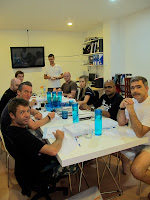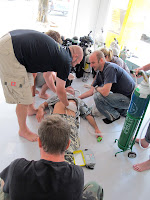So why did I do it?
Apart from the challenge of sitting in a classroom and not being the teacher, not to mention mastering the skills required to pass this course. The rise in popularity of liveaboards and technical diving has created the requirement for Recreational DMT (RDMT) training. RDMTs may carry out patient assessments, provide advanced first aid for a wide variety of medical conditions and be able to liaise efficiently with medical personnel. This is particularly useful when diving in remote areas such as the Similan National Park and Khao Sok National Park, both areas being at least 4 hours away from basic medical care and fully qualified medical professionals.
RDMTs take an important role here in risk assessment, planning for the provision of first aid, emergency communications and casualty evacuation. We are trained to deliver care for the most common non-diving injuries and conditions likely to be encountered during recreational activity onboard boats and to have a good understanding of the mechanisms of diving injuries.
RDMTs are also trained in the provision of care within the hyperbaric chamber. This reflects the current growth in the number of hyperbaric facilities worldwide and the requirement for additional personnel to be familiar with particular aspects of care within this environment.
Khaolak Scuba Adventures will be able to offer better quality first aid care for any diver unfortunate enough to be injured whilst diving with us. We hope to improve safety by applying specialised knowledge and risk assessment techniques to dive planning, leading to a rise in the overall quality of diving activities.
Where did I do it?
Blue Label Diving in Chalong, Phuket, are our business partners offering many years of experience in technical diving and RDMT training. Ben Reymenants is fast developing a reputation for being the best instructor of technical diving and Dive Medic and Hyperbaric chamber operator courses in Asia.
What does the course involve?
 The first part of the course comprises of bringing all basic 1st aid theory up to date and perfecting skills that we all had but never used, including CPR, Oxygen provision and use of Automated External Defibrillators. Then we moved on to advanced airway management, more in depth shock assessment and management and even providing IV fluids, intra muscular injections and sutures.
The first part of the course comprises of bringing all basic 1st aid theory up to date and perfecting skills that we all had but never used, including CPR, Oxygen provision and use of Automated External Defibrillators. Then we moved on to advanced airway management, more in depth shock assessment and management and even providing IV fluids, intra muscular injections and sutures. Of course a great deal of the course focused on recognizing, evacuating and caring for recreational divers with decompression illness. We had a thorough orientation to the SSS hyperbaric chamber facilities at Phuket International Hospital and made two simulated treatments inside, qualifying us to assist in the care of real patients receiving recompression treatment.
The RDMT training is challenging and fun and will promote safer diving and superior care for recreational divers around the world.
 All dive staff at Khaolak Scuba Adventures have to have current EFR (Emergency First Responder) Certification and for the 2011-2012 Season, dive staff will be trained as oxygen providers. Reaction, treatment and evacuations can now be handled in the upmost professional manner as any Khaolak Scuba Adventures' employee can assist the dive staff in emergency situations.
All dive staff at Khaolak Scuba Adventures have to have current EFR (Emergency First Responder) Certification and for the 2011-2012 Season, dive staff will be trained as oxygen providers. Reaction, treatment and evacuations can now be handled in the upmost professional manner as any Khaolak Scuba Adventures' employee can assist the dive staff in emergency situations.





